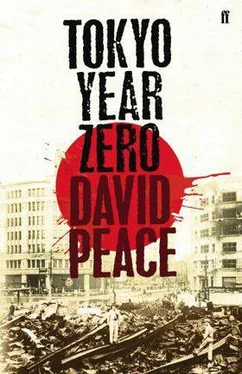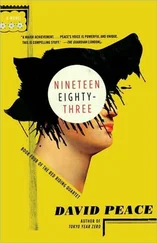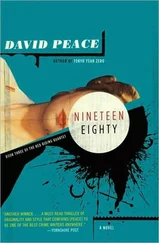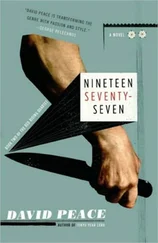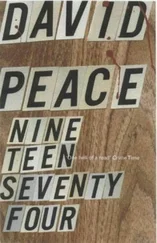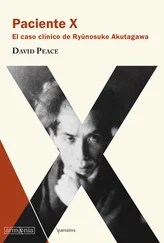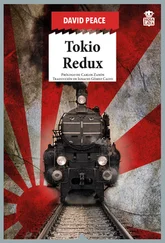‘For Americans only,’ the conductor tells them –
We are pulling out of the Asakusa Tōbu station…
I wait for one of them to argue back with him –
We are crossing the Sumida River now…
But the Japanese all retreat silently –
I am getting away, getting away…
The laws of victory and defeat –
I have escaped. For now…
The wheels that turn and turn again.
*
I itch and I scratch. Gari-gari . The first part of the journey, to Sugito, is not long but the train is slow and the carriage is hot. I itch and I scratch. Gari-gari . Ishida and I do not speak. We close our eyes –
Please let my daughter’s eyes be open now…
But I do not sleep. I itch and I scratch. Gari-gari . I listen to the railway announcements and the running feet as we stop at stations, then the short, sharp whistle of the locomotive. I itch and I scratch. Gari-gari . From station to station, whistle to whistle –
Kita-Senju. Soka. Kasukabe…
Until the train finally pulls into the Tōbu Sugito station and we fight our way out of the carriage and onto the platform. I itch and I scratch. Gari-gari . Then we cross the bridge to the other platform to wait for the Tōbu Nikkō Line train –
To Kodaira country…
It is a two-hour wait on another platform crammed from end to end with men and women, their children and their belongings. I itch and I scratch. Gari-gari . Many with screaming babies strapped to their backs, others with the silent bones of the dead in boxes around their necks, returnees from Manchuria, refugees in their own country. I itch and I scratch –
Gari-gari…
Ishida and I find a small space at one end of the platform in which to crouch down with our knapsacks to wait, to wait and to wait, to itch and to scratch, gari-gari . Ishida still doesn’t speak and I still don’t talk, so again we both close our eyes, we both close our eyes until I sense the people on the platform moving, rising and picking up their children and their belongings, their babies and their bones at the approach of a train, the sound of a whistle and the sight of steam –
Every station. Every train. Every station. Every train…
The people on the platform trying to board the train before it has stopped, before its passengers can get off, pushing and shoving, shouting and arguing, onto the steps, through the windows –
Every station. Every train. Every station…
There are no reserved seats on this train. Every man, woman and child for themselves. Ishida and I get onto the footplate at the end of one of the carriages and we push our way inside –
Every train in the land…
Ishida and I stand crushed in the passageway outside the toilet, the toilet itself filled with an entire family and their possessions, as the train jolts forward, this train that once carried only tourists and day-trippers to such sights as the Shinkyō Bridge and the Tōshōgū Shrine, Lake Chūzenji and the Kegon Falls, this train that now carries only the starving and the lost –
The lucky ones .
I stand wedged between Ishida and a young girl. I itch and I scratch. Gari-gari . I try to turn my head to see out of the window, to find some air and to watch for the stations, but all I can see are lice crawling over the scalp of the young girl in front of me, in and out of her hair they crawl, burrowing and then surfacing, surfacing and then burrowing again, in and out of her hair. I itch and I scratch. Gari-gari .
Maybe thirty minutes later, the train jolts over joints and begins to slow down once again. But there is no announcement –
I turn to Ishida. I ask him, ‘Where are we now?’
Ishida strains to see. He says, ‘Fujioka.’
In the small of Ishida’s back…
The train shudders to a stop in the station. People push and shove again, shouting and arguing as they struggle to get on and off –
In the small of his back, something cold and metallic…
I move away from Ishida. I itch and I itch. I move away from the young girl and her lice. I stand by a window, finally able to breathe, to scratch myself, gari-gari, gari-gari, gari-gari…
The locomotive begins to pull out of the station. Ishida moves closer to me. Now Ishida stands beside me again –
The sun is setting. It is getting dark…
Detective Ishida tells me we should get off the train at Shin-Kanuma station, that we should be there in another hour or so, that he knows the way to the Kanuma police station, that he has already looked it up on a map, that they will be expecting us, that they will have reserved an inn for us for tonight –
They will be waiting for us…
But I have also looked at maps. I have looked at maps of my own. I tell him we’re not getting off the train at Shin-Kanuma station, that we are not going to Kanuma police station –
Not to their inn. Not tonight –
Where they’ll be waiting…
‘Ienaka,’ I tell him. ‘That’s where we’ll get off.’
*
Ienaka is about fifteen kilometres before Kanuma. Ienaka is the closest station to the house where the mother and daughter of the Widow Okayama live. Ienaka is also near to the field in which the body of Baba Hiroko was found on the third of January –
But it is night now. It is dark here…
Ishida and I pass through the ticket gates and walk out of the station into the deserted town. No markets here –
No one waiting for us here…
Nothing here but the silhouettes of dark mountains and the hints of hidden trees looming up over the town and leering down at us as I squat down to open my knapsack and take out my notebook, Ishida beginning to mumble about the lateness of the hour, about it being too late to call on the mother and daughter of the Widow Okayama, too late to visit the field in which Baba Hiroko was found, too late to find an inn for the night –
Everything too late…
‘Here it is,’ I tell him and show him the address of an inn in my notebook and its location on my map. Now I lead Ishida up the slope out of town towards the address. We find it easily –
The Beautiful Mountain Inn…
The detached hotel faces the road and there is still a light on in the porch, moths smashing into the glass which covers the bulb, mosquitoes biting into our foreheads and our necks as we open the door to the inn and apologize to the maid for the late and abrupt nature of our unannounced visit, offering her some of the rice Detective Ishida has brought from his home –
Dark outside, dark inside…
The maid scurries off with the rice and our papers and returns with an older woman who thanks us for the rice and copies down our details. The woman tells us that we are too late for an evening meal, that these days they need a day’s notice to buy and prepare meals, that we are also too late to use the bath, that they heat the bath water only when they have a day’s notice and then only once a day –
No bath. No late night snacks. No sake. No beer…
‘But there will be breakfast,’ she tells us.
The older woman then instructs the younger maid to show us to our room, our room which the woman assures us is the best room that they have, and so we follow the young maid down a dim and humid corridor of unlit alcoves and shuttered windows –
Now the maid unlocks and slides open a door –
Now the maid switches on the light –
And I wish she had not…
The screens have been shredded to strips and the tatami are crawling with bugs, the mosquitoes eating us raw as Ishida and I sit down at a low table beneath a small electric bulb to count the cockroaches, the maid putting out our futons and our bedding, apologizing for the smell and the temperature but assuring us it is better, much better, to keep the windows closed at this time of year –
Читать дальше
